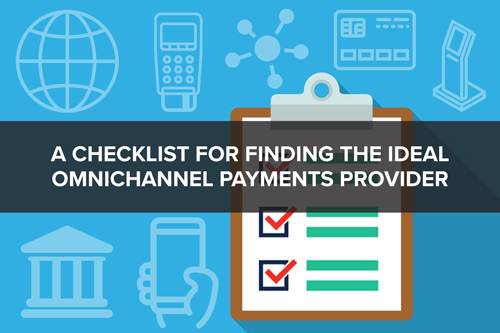 Over the past few years, businesses have accelerated their plans to operate and engage consumers on multiple channels. Consumers browse and order online, pick up in store, shop on their mobile devices on the go, use self-service ordering and self-checkout kiosks, and more. Virtually every competitive ISV has kicked plans into high gear to accommodate these new processes. However, evolving consumer behaviors and merchant operations have also made it vital for you to partner with an omnichannel payments provider that enables transactions at every touchpoint.
Over the past few years, businesses have accelerated their plans to operate and engage consumers on multiple channels. Consumers browse and order online, pick up in store, shop on their mobile devices on the go, use self-service ordering and self-checkout kiosks, and more. Virtually every competitive ISV has kicked plans into high gear to accommodate these new processes. However, evolving consumer behaviors and merchant operations have also made it vital for you to partner with an omnichannel payments provider that enables transactions at every touchpoint.
Use this checklist to find a partnership that will help you deliver what merchants need as well as benefits for your business.
Omnichannel capabilities
Of course, your payments partner needs to support payments on any channel, from in-store, card-present payments and self-checkout to card-not-present payments, including online, in-app, and mobile.
However, in addition to allowing your users to accept payments on any channel, an omnichannel payments provider should also provide consumers with consistent experiences via an integrated platform of payment functionality and services. Using different systems for different types of payments can allow merchants to accept payments on various channels, but it doesn’t enable seamless experiences and easy management and visibility.
Look for a partner with a single, unified payments platform that provides all of the functionality your clients need.
Evolving functionality
A payments platform that meets your users’ needs and consumer demands today probably won’t meet them in a few years. The ideal omnichannel payments provider for an ISV partnership will have a track record of innovation that shows the company keeps up with industry and consumer demands.
For example, your payments partner should enable cross-platform tokens, app-based payments, ACH processing, QR code payments, text-to-pay, and unattended payment solutions today and be able to provide you with a roadmap about features in development. Also, ensure your payments partner offers solutions that are compatible with terminal operating systems as well as mobile, tablet-base and browser-based solutions to keep up with the new ways that retail sales associates and restaurant staff work.
Hardware and processing options
It’s always smart not to lock your users into using one type of hardware to give them feature and price options, but it’s particularly vital during the current chip shortage and supply chain challenges. A hardware-agnostic payments partner offers your users choices and alternatives when a particular payment device isn’t available.
Likewise, you don’t want to lock your users into one payment processor – and possibly higher-than-average payment processing fees. Before partnering with a payments solution provider, dig deeper into the type of payments solution provider you are considering as a partner. Some companies are “aggregators” that enable merchants to process payments under one account. Although these companies may bill themselves as simple and easy to use, they offer only limited fee structures (if any choice at all).
Understanding how a payments solution provider is structured can provide valuable insight into the service it can provide your clients. Look for a partner organization that gives your clients hardware and payment processor choices.
Security
Work only with an omnichannel payments provider that makes payment security a top priority. Your potential partner’s solution must be Payment Card Industry Data Security Standard (PCI DSS)-certified and support EMV payments.
The ideal partner will also offer you additional security measures such as end-to-end encryption, point-to-point encryption (P2PE) encryption and tokenization to keep payment data safe and keep your clients in compliance with PCI.
Merchants Have a Checklist, Too
As you go through the checklist to choose an omnichannel payments provider partner, remember that merchants have a checklist of their own. They want to use point of sale (POS) and other business solutions that deliver the functionality they need, including payments integration.
Your ability to deliver everything on their lists depends on a partnership with the right omnichannel payments provider.
The ideal partner will also offer you additional security measures such as end-to-end encryption, point-to-point encryption (P2PE) encryption and tokenization to keep payment data safe and keep your clients in compliance with PCI.



